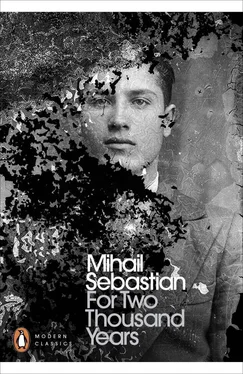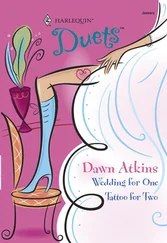‘You’re a sane, well-balanced person, but you’re too sane. You lack that little grain of instability without which life never reveals itself to us, without which our immediate horizons never open further. You lack a sense which is less precise than sight, but more essential: “a sense of the tragic”.’
S.T. Haim got into Paris two days ago. He’s staying in Rue Daunou, in that sparkling little hotel where I promise myself, in my sumptuous dreams, to live some day. His suitcase has been around Europe a few times and is covered with coloured stickers. He has been in Paris previously in recent months, though never alone. Without a doubt there’s a woman in his life, but the voluble S.T.H. clams up and becomes sombre whenever the topic arises.
We had a long wander together, from the Louvre to Abbesses by foot, and from there up towards the Place du Tertre.
I was afraid he might not like this quarter, which I love more than any.
‘You can’t imagine how provincial Paris seems, when coming from elsewhere in Europe. You get the feeling of having stumbled into a station where the express trains don’t stop. It smells of 1924, or 1928 at most. And here we are in 1931. Never mind Berlin or Vienna, where things are at their most fevered, even Bucharest is livelier, more up to date. When you cross the border at Bale, heading for Paris, the clock goes forward an hour, but you go back in time several years. You’ll see what I mean this autumn, when you leave. In Europe, anywhere you go, you’ll feel something simmering that isn’t felt here and isn’t even guessed at.’
‘I don’t know that I will leave in the autumn.’
‘Yes, you will. The Dieppe project won’t happen. You’ll see.’
‘How do you know?’
‘I don’t. I can see. I see times are changing and I see what’s possible and what isn’t.’
*
I was surprised to learn that old Ralph T. Rice is well enough acquainted with S.T.H. The pair of them had a two-hour discussion up in the office in Boulevard Haussmann. S.T.H. did some work in the past year for Rice Enterprises in Berlin, where he has business information and openings that are of value to old Ralph.
It amuses me to think of the expression of fear the old man had while listening to S.T.H., who paced back and forth across the office floor, waving his index finger in the air to illustrate the scale of the catastrophe.
‘It’s all over, sir, it’s all over. You can shut up shop.
‘We’re heading for revolution. It’s plain for all to see. Germany can’t hold out any longer, Austria certainly can’t either, the Far East is simmering. It’s not a matter of a seven- or an eleven-year recession, as you read in the books on economics, it’s a general calamity. I could demonstrate it with figures, but I’d rather not. I’ve too much respect for the businessman I sense you to be. I’ve come from Europe. Tell me: haven’t you noticed the whiff of dynamite tickling that nose of yours when you went sniffing after petrol?’
Old Ralph frowns at the ink bottle, as if that first stick of dynamite S.T. Haim evoked were there on his desk.
*
I’ve introduced him to Maurice Buret. Fed up with conversations about social problems, which he has had already with myself and Rice, S.T.H. was admirable. He becomes a good-humoured fellow as soon as he gets off the subject of the fate of the universe.
The three of us went to the Colonne concert. Honeger’s Horace victorieux programme was playing, a serious, flowing, precise piece with its great complexity tamed by a deceptive air of simplicity. I left refreshed and serene. Princely order rules the world — I reflected to myself — as long as such victories are possible.
Our evening continued in Montmartre, where some time ago I discovered a miraculous Anjou. S.T.H. was in fine high spirits. He gave us the inside story on the Oustric scandal, which he turned into a full-length novel involving women, affairs, successes on the stock exchange and in the boudoir, all arranged wonderfully and tumbling out at speed, as in a film. He has a wealth of knowledge, but he also knows how to spin a yarn, which he does rather oddly but in a way that’s logical and hard to discredit. His explanations have something of Ponson du Terrail; they’re melodramatic and sensationalist but are plausible at least, even if not strictly accurate.
‘With your talents, you’re going to end up working for the Intelligence Services.’
‘It’s the only job that could interest me. The only one, certainly, if it wasn’t that something more decisive, more thrilling, exists. I’m sure top-level police work is highly engaging. But it’s limited, poor stuff. It’s a job requiring relationships, connections, hierarchies. I need something else. Let me whisper it in your ear, so we’re not overheard.’
He leaned over the table and whispered confidentially: ‘ The ab-so-lute. ’
‘ Rien que ça? ’ asked Buret.
*
I haven’t seen S.T.H. for four days. I open the paper today and on page three see: Major arrests of communists in Romania . S.T. Haim is listed among the top names. I’m stunned. I called the hotel. Indeed, it’s so: S.T.H. left Paris on the 12th. Today is the 18th. Enough time for him to have reached Bucharest and been arrested.
I’ve written home for news, to Pârlea and Marin. I’ve no idea what could have happened. He was so sure of himself, so calm in his heart. It seems like some kind of detective story. I find it disturbing to think that the man I was walking around with only a few days ago in Paris is now locked up in Bucharest. It’s a whole different order and level of events. How can it be? I walked alongside him, sat with him at a table, we talked, smoked, drank, and there was nothing about him to suggest his fall was near. Not even a distant sign announcing that somewhere, in that hour, his fate was being decided.
I’m unable to accept this ordinariness and every detail of our evening comes back to me, as though each one might contain a clue. His grey suit, his blue tie with white dots, the Chesterfields he’d bought on the way from the tobacconist’s beside Châtelet …
*
No reply from Pârlea, none from Marin either. On the other hand, a grocery-store envelope, with the address hurriedly scrawled. I open it: it’s from S.T.H.
You’ll remember the hour of crisis we spoke of once. It has arrived.
He has an extraordinary memory. I had forgotten.
At the upper end of Şerban Vodă, where the houses begin to thin out, a motor car provokes something of a stir, as in a provincial town. You see the faces of the curious at the windows, doors opening as we pass, children trooping after us.
‘Are you going to the crematorium?’ a woman leaning in a doorway asked the driver. ‘Go to hell,’ he replied, furious at the potholes we’d just landed in.
To our left was a sad, dirty wasteland, with broken crates, rags, tin cans and smouldering heaps of rubbish. A tree that had shed half its leaves, a sheepdog with nothing to do and, in places, tufts of grass that had endured until early November.
… Perhaps my visit is a mistake. What can I say to him? What can he say to me? Nothing makes me feel more powerless than a solemn situation, since ordinary phrases seem insufficient and I find serious declarations embarrassing. For three days, since obtaining a visitor’s pass, I can think of nothing but the moment of farewell.
I’ve imagined every gesture dozens of times, and each time it strikes me as either excessive or inadequate. I’m even uneasy about the tin of cigarettes I’m bringing him: I don’t know how to give it to him. I’d like to manage the casual gesture with which you ask someone to help themselves by proffering a cigarette. I’d like to shake his hand simply, as I would in the street, to make it seem nothing has changed, that our meeting here is nothing out of the ordinary, that his presence here in jail isn’t a catastrophe …
Читать дальше












